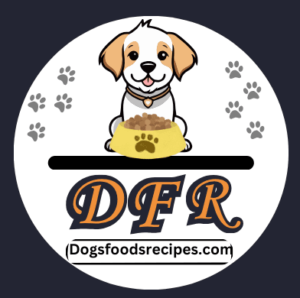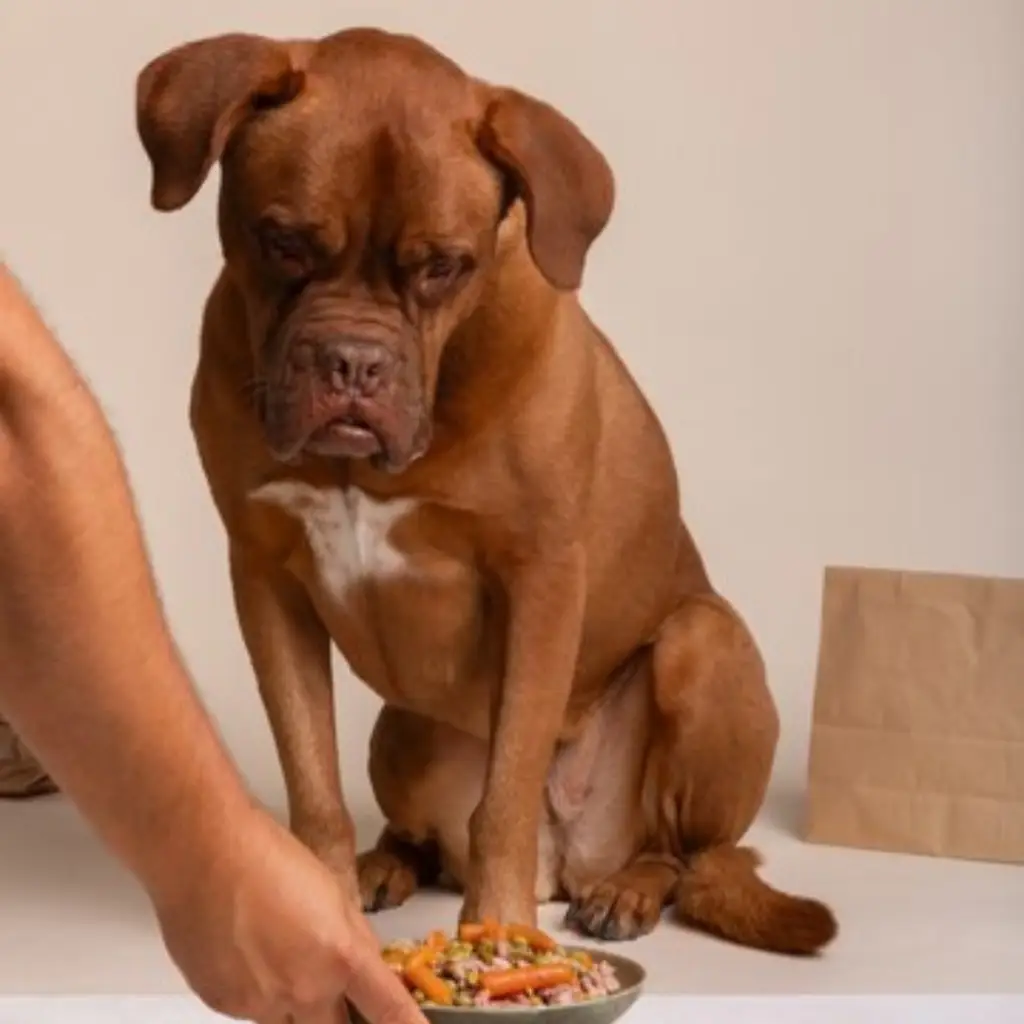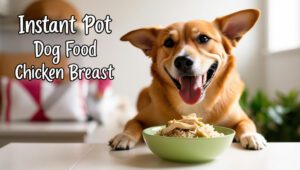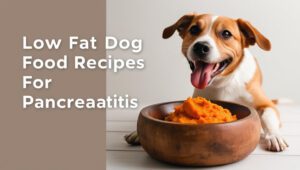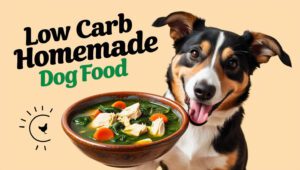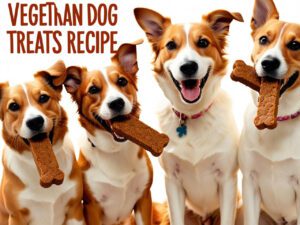As pet owners, our primary goal is to ensure our canine friends live happy, healthy lives. Maintaining a healthy weight is crucial for their well-being, especially in today’s world of processed pet foods. Fortunately, this article offers the most popular best top 3 homemade dog food recipes vet-approved for weight loss. Recipes incorporate nutrient-dense, low-calorie ingredients to aid your pet in losing weight safely and sustainably. They also ensure they get all the necessary vitamins, minerals, and nutrients for optimal health.
Key Takeaways
- vet-approved homemade dog food recipes for weight loss
- Nutrient-dense, low-calorie ingredients to support healthy weight management
- Emphasis on portion control and calorie counting for effective weight loss
- Incorporation of lean protein sources, wholesome carbohydrates, and healthy fats
- Vitamin and mineral-rich superfoods to ensure a balanced, nutritious diet
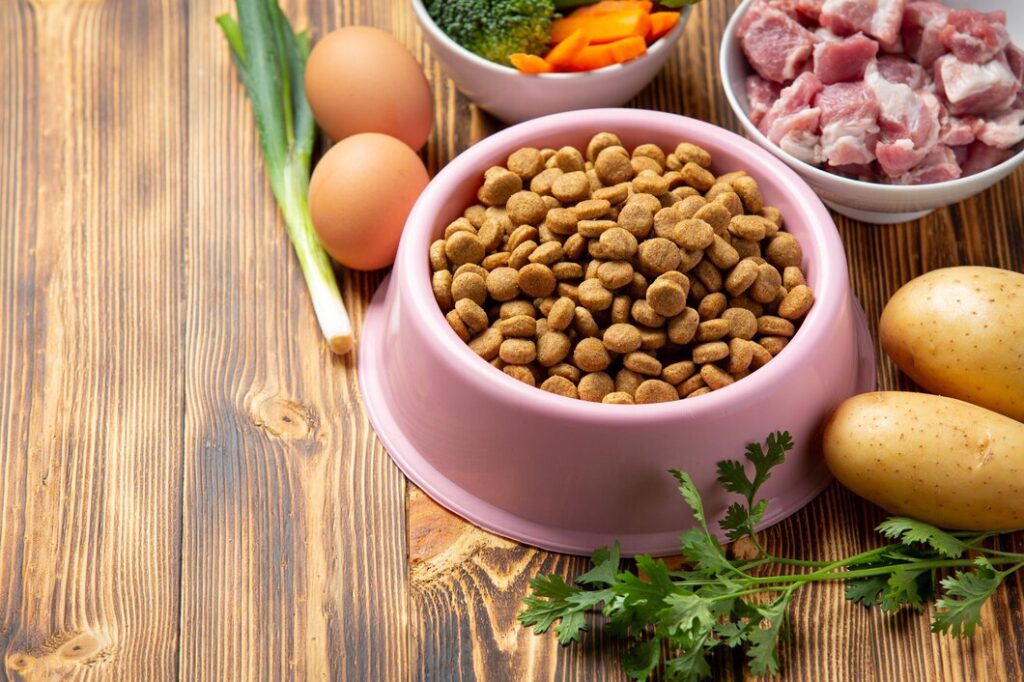
Introduction: The Importance of Healthy Homemade Dog Food
Crafting nutritious homemade dog food can significantly improve your canine’s health and wellbeing. Unlike commercial kibble, which often contains fillers and preservatives, homemade options allow you to control your pet’s diet. This ensures they get the nutrients they need, especially for those with kidney disease.
Switching to homemade meals means your dog eats a balanced, nutrient-rich diet suited to their needs. This is vital for dogs with health issues like kidney disease. A well-planned homemade diet can greatly improve their condition and overall health.
Homemade dog food also makes mealtime enjoyable for your pet. By using their favorite ingredients and flavors, you can make eating a positive experience. This approach turns a routine task into something special for your furry friend.
Next, we’ll look at vet-approved recipes for weight loss. We’ll discuss the importance of portion control, using nutrient-dense ingredients, and creating meal plans for your dog’s health and wellbeing.
Homemade Dog Food Recipes Vet Approved For Weight Loss
Creating homemade dog food for weight loss requires a focus on portion control and calorie management. Veterinarians recommend recipes that use low-calorie, nutrient-dense ingredients. These ingredients help your dog lose weight safely and sustainably.
Understanding Portion Control and Calorie Counting
Controlling portions is vital for a dog’s weight management. It’s crucial to feed your dog the right amount, considering their size, activity level, and individual needs. Measuring food portions and tracking caloric intake are key to your dog’s weight loss success.
Selecting Low-Calorie, Nutrient-Dense Ingredients
Choosing the right ingredients is essential for homemade weight loss dog food. Focus on low-calorie, nutrient-dense options that keep your dog full without adding extra weight. Lean proteins like turkey or chicken, complex carbs such as brown rice or quinoa, and fiber-rich veggies like green beans or sweet potatoes are excellent choices.
| Ingredient | Calories (per 100g) |
|---|---|
| Lean Turkey | 165 |
| Brown Rice | 112 |
| Sweet Potato | 86 |
| Green Beans | 31 |

By adhering to these guidelines and using low-calorie, nutrient-dense ingredients, you can aid your dog’s weight loss efforts. This approach ensures they get the necessary nutrients for good health.
Lean Protein Sources for Weight Loss Dog Meals
Striving for a healthy weight for your dog requires a fine balance. The cornerstone is the strategic use of lean protein sources. These ingredients are crucial in homemade dog food recipes for weight loss. They support muscle upkeep and overall health during the weight management process.
Top lean protein choices for dogs include:
- Turkey: A versatile and low-fat protein that can be easily incorporated into a variety of homemade weight loss food for dogs
- Chicken: A classic choice that is high in protein and low in calories, making it an excellent addition to homemade meals aimed at shedding extra pounds.
- Fish: Specifically, lean options like tilapia and cod are rich in omega-3 fatty acids, which can support skin and coat health while promoting weight loss.
When choosing these lean proteins, focus on high-quality, minimally processed options. Ensure they are free from harmful additives or preservatives. By doing so, you can create homemade dog food weight loss. These recipes will provide your dog with the vital nutrients they need to flourish.
Wholesome Carbohydrates for Balanced Doggy Diets
For dogs with kidney disease, choosing the right carbohydrates in homemade food is key. These carbs give energy and help with weight control. They make dogs feel full, which is vital for those trying to stay at a healthy weight.
Fiber-Rich Options for Satiety and Digestive Health
Adding fiber-rich carbs like brown rice and sweet potatoes to your dog’s diet can greatly benefit their health. These carbs give long-lasting energy and keep their digestive system healthy. They are perfect for dogs with kidney disease.
- Brown Rice: A whole grain that is rich in fiber, nutrients, and complex carbohydrates, making it an ideal choice for dogs with kidney disease. Brown rice can help promote feelings of fullness and support digestive regularity.
- Sweet Potatoes: These nutrient-dense root vegetables are packed with fiber, vitamins, and minerals, making them a fantastic addition to homemade dog food recipes. Sweet potatoes can help regulate blood sugar levels and provide a slow-release source of energy.
By adding these fiber-rich carbs to your dog’s meals, you support their health, weight, and kidney function. You also ensure they have a balanced and fulfilling diet.
| Carbohydrate | Fiber Content | Nutritional Benefits |
|---|---|---|
| Brown Rice | 3.5 grams per cup | Complex carbohydrates, B vitamins, magnesium, and antioxidants |
| Sweet Potatoes | 4 grams per medium potato | Vitamins A, C, and B6, as well as potassium and manganese |
Healthy Fats: Essential for Weight Management
Reducing caloric intake is key for canine weight loss, yet healthy fats are crucial for a balanced diet. These fats are vital for your pet’s health and well-being, especially when managing weight. They support your furry friend’s overall health during the weight loss process.
Healthy fats, such as those in fish oil and coconut oil, are beneficial for dogs losing weight. These fats aid in metabolism regulation, increase satiety, and keep the coat and skin healthy. Adding the right amounts of healthy fats to your balanced weight loss dog food recipes ensures your pet gets the necessary nourishment for their weight goal.
Omega-3 Fatty Acids for Weight Loss
Omega-3 fatty acids, found in fish oil, are crucial for dogs on a homemade dog food for weight loss plan. These fats reduce inflammation, which is linked to excess weight and joint problems. They also improve insulin sensitivity, aiding in weight regulation.
Coconut Oil: A Versatile Weight Loss Ally
Coconut oil is a great source of healthy fats for weight management in dogs. It contains medium-chain triglycerides (MCTs) that can increase metabolism and enhance feelings of fullness. Adding coconut oil to your homemade dog food is a simple way to give your pet these beneficial fats.
| Healthy Fat Source | Benefits for Weight Loss |
|---|---|
| Fish Oil | Reduces inflammationEnhances insulin sensitivitySupports healthy skin and coat |
| Coconut Oil | Boosts metabolismPromotes feelings of fullnessProvides a source of healthy fats |
By balancing healthy fats in your dog’s diet, you support their overall health and help them reach their weight goals.
Vitamin and Mineral-Rich Superfoods for Dogs
It’s vital to make sure your dog’s meals are full of vitamins and minerals for their health and weight loss. Adding nutrient-dense superfoods to their diet offers many benefits. These foods help more than just control calories.
Incorporating Nutrient-Dense Supplements
Even with a balanced homemade diet, sometimes supplements are needed for specific nutritional gaps. For dogs with kidney disease, certain superfoods and supplements are very helpful:
- Sweet potatoes: They are full of vitamins A and C, and fiber. Sweet potatoes support kidney function and help with weight management.
- Green beans: These are low in phosphorus but high in vitamins. They’re a great choice for homemade dog food for kidney disease.
- Omega-3 supplements: Fish oils or algae-based supplements can lessen inflammation and support kidney health.
- Antioxidant-rich herbs: Turmeric, ginger, and parsley offer extra nutritional support for dogs with kidney problems.
By picking and adding these nutrient-rich foods to your dog’s meals, you make sure they get the vitamins, minerals, and other important compounds they need. This supports their health and helps them lose weight.
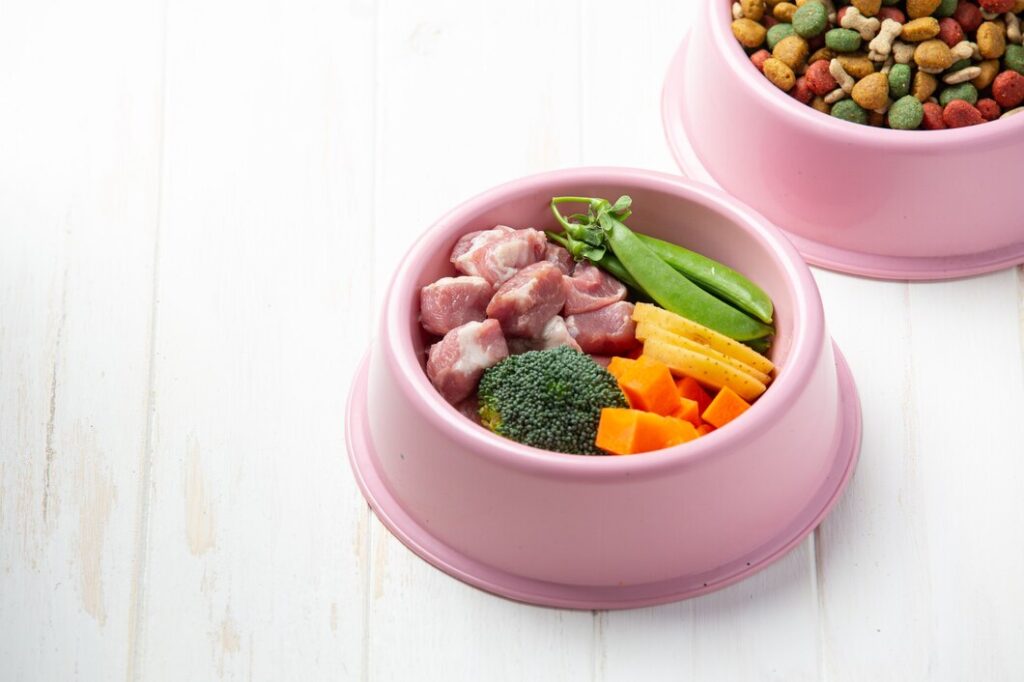
Recipe 1: Lean Turkey and Brown Rice Medley
Discover easy homemade dog food recipes vet-approved designed for your pet’s weight loss. It features lean turkey, brown rice, and fresh vegetables. This combination is vet-approved and supports your dog’s health.
This recipe offers a balanced, low-calorie meal. It helps your dog lose weight while keeping them well-nourished. By choosing these ingredients, you ensure your pet’s dietary needs are fulfilled during weight loss.
Ingredients:
- 2 lbs ground lean turkey
- 2 cups cooked brown rice
- 1 cup diced carrots
- 1 cup chopped green beans
- 1/2 cup diced sweet potato
- 2 tablespoons olive oil
- 1 teaspoon dried parsley
- 1/2 teaspoon ground turmeric
- 1/4 teaspoon black pepper
| Nutrient | Amount Per Serving |
|---|---|
| Calories | 260 kcal |
| Protein | 30 g |
| Carbohydrates | 20 g |
| Fat | 8 g |
| Fiber | 3 g |
This recipe is not just tasty but also rich in nutrients for your dog’s health. It gives you peace of mind, knowing you’re feeding your pet a vet-approved meal.
Recipe 2: Baked Salmon and Sweet Potato Feast
Try our Baked Salmon and Sweet Potato Feast for a nutritious, tasty homemade dog food option. It features omega-rich baked salmon, paired with sweet potatoes and other wholesome ingredients. This recipe is a great choice for your pet’s health.
Omega-Rich Fish for Canine Health
Salmon in this recipe is a fantastic source of omega-3 fatty acids. These are crucial for your dog’s skin and coat health. Omega-3s also help with joint function and overall well-being.
By adding this homemade fish dog food recipes vet-approved to your pup’s diet, you ensure they get the nutrients they need. It’s a great way to support their health and vitality.
| Ingredient | Amount |
|---|---|
| Baked Salmon | 2 cups |
| Sweet Potatoes, diced | 1 1/2 cups |
| Brown Rice | 1 cup |
| Frozen Peas | 1/2 cup |
| Olive Oil | 2 tablespoons |
| Turmeric | 1 teaspoon |
This recipe is not just vet-approved; it’s also a delicious, nutritious meal for your dog. With baked salmon and sweet potatoes, your dog gets a balanced diet. This supports their health and aids in weight management.
Recipe 3: Chicken and Quinoa Stir-Fry Delight
This Chicken and Quinoa Stir-Fry Delight is a top choice for homemade dog food recipes vet-approved for weight loss. It’s loaded with lean protein, complex carbs, and fresh veggies. This dish is both nutritious and tasty, perfect for dogs trying to lose weight.
The recipe starts with boneless, skinless chicken breast. This lean protein supports muscle mass and keeps calories in check. Quinoa, a grain rich in protein, offers complex carbs that fuel your dog’s energy without adding too many calories.
For added nutrition, we’ve added fresh veggies like broccoli, carrots, and bell peppers. These veggies are full of vitamins, minerals, and fiber, boosting your dog’s health and wellbeing.
This homemade dog food recipe for weight loss combines lean protein, complex carbs, and fiber-rich veggies. It’s an ideal choice for helping your dog manage their weight. Remember, portion control is crucial. Always consult your vet to find out the right serving size for your dog.
Transitioning to Homemade Dog Food: A Gradual Approach
Introducing homemade dog food into your pup’s diet requires a thoughtful and gradual approach. This is especially true if your canine companion has specific dietary needs, such as those associated with kidney disease. By carefully incorporating homemade meals, you can ensure a smooth transition that meets your dog’s unique nutritional requirements.
When transitioning to homemade dog food for kidney disease, it’s crucial to work closely with your veterinarian. They can provide guidance on the appropriate calorie, protein, and mineral levels your dog needs to maintain optimal health. This personalized approach will help you create a balanced homemade diet that supports your pet’s well-being.
To ease the transition, start by gradually mixing small amounts of homemade food with your dog’s current commercial diet. Slowly increase the homemade portion over the course of several weeks, allowing your furry friend to adapt to the new flavors and textures. Be patient and attentive to your dog’s response, making adjustments as needed to ensure a seamless switch.
- Consult your veterinarian to develop a personalized homemade diet plan for your dog’s specific needs.
- Gradually introduce homemade meals, starting with small amounts mixed into your dog’s regular food.
- Increase the proportion of homemade food over several weeks, monitoring your dog’s response and making necessary adjustments.
- Ensure the homemade recipes are low in phosphorus and sodium, while providing high-quality proteins, complex carbohydrates, and essential vitamins and minerals.
- Supplement with kidney-friendly ingredients, such as lean meats, sweet potatoes, and green leafy vegetables.
By taking a thoughtful, step-by-step approach to transitioning your dog to a homemade diet, you can help them maintain their health and well-being, even with the challenges of kidney disease.
Conclusion: Embracing Homemade Dog Food Recipe for Weight Loss
This guide has detailed vet-approved homemade dog food recipes for weight loss. These recipes are designed to aid in your canine’s weight management while maintaining their health. By using these low-calorie meals, you support their health journey.
Homemade dog food for weight loss brings several advantages. It allows for better control over portions and calories. It also ensures the inclusion of whole, nutrient-rich ingredients. The recipes focus on lean proteins, fiber-rich carbs, and healthy fats. These are crucial for a balanced and fulfilling homemade weight-loss dog food diet.
When transitioning your dog to a homemade diet, do it gradually. This allows their digestive system to adjust. With patience and consistency, you can successfully incorporate these homemade dog food recipes vet-approved for weight loss. You’ll see a positive change in your pet’s health and weight.
FAQ
What are some vet-approved homemade dog food recipes for weight loss?
This article showcases vet-approved homemade dog food recipes tailored for weight loss. These recipes use low-calorie, nutrient-dense ingredients to help your dog lose weight safely and sustain a healthy weight.
Why is it important to transition to a homemade dog food diet?
Switching to homemade dog food offers significant advantages over commercial kibble. It allows for greater control over ingredients, tailoring the diet to your pet’s specific needs, and ensuring a balanced, nutritious intake. This is crucial for weight loss and overall health.
How do I ensure proper portion control and calorie counting when making homemade dog food for weight loss?
Mastering portion control and calorie counting is vital for homemade dog food recipes aimed at weight loss. This guide offers strategies for choosing low-calorie, nutrient-dense ingredients and maintaining suitable serving sizes. These steps support your dog’s weight management goals.
What are the best sources of lean protein for homemade dog food recipes?
Lean protein sources like turkey, chicken, and fish are vital for maintaining muscle mass and supporting your dog’s health during weight loss. This guide details the best lean protein sources for homemade dog food recipes, ensuring optimal results.
How can I incorporate wholesome carbohydrates into my dog’s homemade diet for weight loss?
Carbohydrates are essential for energy and satiety in dogs. The article emphasizes the importance of choosing wholesome, fiber-rich carbs like brown rice and sweet potatoes. These support your dog’s health and weight management goals.
What is the role of healthy fats in a homemade dog food diet for weight loss?
Healthy fats are crucial for a balanced diet, even when reducing calories for weight loss. This article discusses the role of healthy fats in fish oil and coconut oil. They support your dog’s weight management while maintaining health and well-being.
How can I ensure my dog’s homemade meals are packed with essential vitamins and minerals?
Ensuring your dog’s meals are rich in vitamins and minerals is vital for their health and weight loss. The article highlights nutrient-dense superfoods and the benefits of supplements for meeting nutritional needs.
Can you provide a sample vet-approved homemade dog food recipe for weight loss?
Yes, the article includes vet-approved recipes like Lean Turkey and Brown Rice Medley, Baked Salmon and Sweet Potato Feast, and Chicken and Quinoa Stir-Fry Delight. These recipes are designed for weight loss.
How should I transition my dog to a homemade dog food diet for weight loss?
Transitioning your dog to homemade food requires a gradual, strategic approach for a smooth adjustment. The guide offers advice on incorporating homemade meals into your dog’s diet, addressing health concerns, and dietary restrictions.
Are there any special considerations for dogs with kidney disease when transitioning to homemade dog food?
Yes, dogs with kidney disease need a customized homemade diet. It’s crucial to work with your vet to create a recipe that meets their nutritional needs. The article provides information on recipes suitable for dogs with kidney disease.
If you have any questions or any problems so please don’t hesitate to contact us
